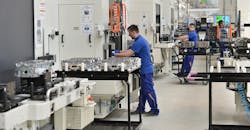Did COVID Really Change Anything on the Factory Floor?
I recently read through a fascinating international survey of 1,000 frontline manufacturing workers based in the United States, Germany, France, Spain, and the United Kingdom to get the latest pulse on their professional situation and outlook, technology usage, and productivity during COVID-19. The survey was conducted by Parsable, the provider of Connected Worker, the leading platform for frontline industrial workers. The findings provide a good look into what impact the pandemic has made—or not made—on the factory floor.
Given all that we’ve heard over the past 20 months that COVID was “unprecedented” and “would change everything forever,” it was interesting to learn from the data how little has truly changed.
In one area, at least in the U.S., workers do feel more appreciated during COVID than prior to the outbreak (63% v. 37%). Their European counterparts were evenly split as to whether they felt more admired or not.
Still, while COVID remains on top of so many minds around the world, only 27% of all the frontline workers surveyed said catching the disease was their primary safety concern at work. Accidents remain overwhelmingly the biggest worry.
When asked if their employers had implemented any new technology to manage COVID, just over half of all respondents noted that anything new had been implemented. Moreover, 83% of workers reported they still rely on paper to follow their work instructions and/or to track their work. This dependence on the analog way of doing things continues, while 80% of all respondents said they have no concerns about using digital tools and processes.
Clearly, based on the findings here, a significant number of manufacturing firms have done little or nothing to alter the ways that things get done since the arrival of the pandemic. And, paradoxically, this lack of significant change is occurring at the same time workers of all ages say they feel more comfortable than ever in using new tools and processes.
So, the question begs: if a global pandemic won’t change how things get done on the factory floor; then, what else will it take for manufacturers to become more up-to-date as it relates to managing their workforce?
An answer might lie in the next generation.
For those workers ages18-24, who were raised on digital products like mobile phone and tablets, nearly 70% of “Generation Z” said they expected to leave their current employer within the next five years. One wonders if the pervasive analog culture within so many manufacturing firms today is a big reason why younger manufacturing workers are so frustrated.
As manufacturers seek to build a loyal, stable workforce, they might well consider making some changes to the ways things get done. This could start by evolving alongside their ever-more tech savvy workers; and, listening to their ideas and experiences with new technologies.
Andrew R. Thomas, Ph.D., is associate professor of marketing and international business at the University of Akron; and, a member of the Core Faculty at the International School of Management in Paris. He is a bestselling business author/editor of 23 books, including The Customer Trap: How to Avoid the Biggest Mistake in Business, Global Supply Chain Security, The Final Journey of the Saturn V, and Soft Landing: Airline Industry Strategy, Service and Safety.
